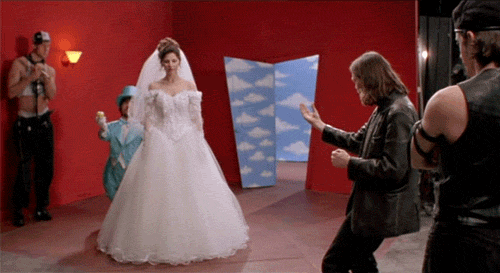A lot of debate surrounds whether or not a budding filmmaker should go to film school, or if film should even be a "real" major. In my initial debate on whether or not film school was worth it, many people would cite famous directors who never received "formal" training. Those people are often parents who didn't want to see my education go to something potentially non-lucrative like the cinematic arts, or people who really don't understand how much effort goes into making movies/television.
Yes, it is true some very successful filmmakers did not go to film school. But the oldest film schools aren't even 100 years old! Believe it or not, film is still a relatively new media. Still, I didn't let any of that sway my final decision:
I currently attend Towson University for my undergraduate studies, and no, as of now it isn't one of the "Ivies" of the film world. But I have learned so much already, both in the classroom and out of the classroom. While my background as an actress already gave me an inside view of the workings of a set, a lot of technical things that would have taken countless hours of Googling and PA (production assistant) work I have learned during my time as a Tiger.
I wanted to write this article while I am still in film school, because I think it's important that people know just how great this formal training can be! Without further ado, here are my top ten things I've learned so far:
(Living in Oblivion. Perhaps one of the best movies about movies... EVER.)
1. You find your tribe.
When you walk into a new class, you could find later in the semester that you're sitting next to a person you really vibe creatively with. A major lesson I learned as an actress was to keep working with people you not only like as a professional, but also like because they can "read your mind" and often work on the same creative page. One of my acting mentors recently started a production company with some of his tribe, and I plan on doing the same with my friends from film school.
2. You're always doing something.
You know that panicked feeling you get that wakes you up in the middle of the night, and causes you to say "Oh sh*t, did I forget to turn something in?" You get a lot of that in film school, except it's "Oh, now I know how to shoot this" or "Crap, I should've written that, it sounds better".
Film is hard work: a lot of people play multiple roles, sometimes because you want to, sometimes because you're forced to (you know, grades and stuff). A typical day for me could be class from 9-5, do laundry editing until 7, jog for a bit to revitalize legs, emailing/visiting locations, casting actors, and calling friends/family for money until 11, shower/eat script revising until 1 AM. Wash. Rinse. Repeat. This has taught me that this life can be brutal, but I love doing it. I haven't worked a day yet, and I really can't wait to get paid for it.
(Pitch on Fox)
3. Show up with your game face on.
Your professors and your colleagues are watching you. I know this because I'm doing the same: I make notes on who shows up late, who has their sh*t together, who had really good actors, crappy lighting, great sound, etc.
We recognize that we are still students learning just what it takes to make a film amazing, but you need to show that you're actively putting your best foot forward. You never know where your next professional job is going to come from, and there's a chance that your impressions now will affect your jobs in the future.
4. Keep an open mind.
The Hogwarts sorting hat knows best, right? Film school is kind of the same thing: it shows you what you are good at if you didn't know already.
I walked into my first day at TU knowing I wanted to direct, I would probably suck at lighting, excel in sound, and hate editing. Almost two years later, I still want to be a director, but... I also have a knack for producing and I really enjoy spending hours in the editing bays. There are some areas and skills I know I need to work harder at, but now I know what comes naturally and what doesn't. Knowing that will help me look for those jobs that I know I can do well, knowledge which I didn't have before I want to film school.
(Huff Post)
5. Stay up to date and update.
I didn't go to a high school that had film editing classes, and I found that a lot of my peers were already Adobe Certified Associates or were wizards at Final Cut. Needless to say, I had a lot of catching up to do. But I learned so much more in a shorter amount of time by having an in-person professor I can talk to versus trying to dig for answers in a 10-part video segment on YouTube. I also didn't have to buy the software and teach everything to myself: the University's labs have all of it for me!
6. Use all the equipment.
Cameras are expensive af. If you don't have at least $1000 you can't afford a solid camera. And as much as I love the shoot-with-your-phone movement, you can't get the same effect that having beautiful prime lenses can give you. At TU, we have access to a lot of different industry-standard cameras, lenses, and other equipment to help us tell our stories. Lights, slates, edit bays, sound recording rooms (including Foley and surround sound studios), we have it all.7. Your professors are living gold.
I go to them for all kinds of questions: How do I add a high-filter bypass here? Who should I contact at the SAG-AFTRA office? Where should I look for jobs/internships?The profs here (especially the adjuncts) were or are working professionals in our industry. At many film schools, both well-known and not-so-much, this will always be the case. Your professors, besides your classmates, are going to be your most valued asset and experience when you go to film school..
8. Production assistants: not just coffee go-fors, but C-47 fetchers, too.
All of the on-set lingo that you need to know you'll be able to learn without risk of embarrassment in film school. For some people, that might not be the biggest selling point for picking film as a major, but trust me: if it's your first time PAing on a professional set and someone asks for a C-47, you'll be happy you went.
Speaking of PAing:
Yeah. PAs are the bottom of the ladder. But in this world, just like the rest of it, you have to start somewhere... and that somewhere is usually getting coffee for everyone or changing the trash can liners (or both). But you'll get the chance to observe the working of a set without a ton of movie-ruining responsibility. Get a few (or a lot) of PA jobs and learn something from it.

9. Go into the world.
Going to film school means that you know the lingo to get onto set... but you still need on-set experience to put theory into practice. Your school can help you get those internships at places or on films which may require you to be a student when you apply. (Yes, even the Big Six require many of their interns to be in school or recently graduated... and they'll need proof!) And instead of spending all of your time on a learning curve, you'll be working on improving your creative voice.10. Theory is the gateway to practice.
All of the things I listed above are things you could theoretically do on your own, but this I swear you can't get this anywhere besides film school: theory. Take all of the theory and history classes you can, because who doesn't want to get graded on watching movies and having your mind opened to the different film styles of the world? Here you will get LIVE conversation and debate about films... and how/why they were shot the way they were, why that director's decision didn't (or did) move the narrative of a particular scene forward, and why this type of edit makes things more clear to the audience, etc. These debates happen between people who aren't your explosion-loving, self-professing "movie connoisseur" friends: they're people who actually analyze film for a living.
Film school isn't for everyone, and not everyone needs film school. But I haven't regretted going to film school, not once. I have made some of my biggest strides as an artist here; partially it was just showing myself that I have talent for some of these things. I have met some incredible people, some of which are going to play major parts in my life journey. And I can't wait for the next part of my journey as a student of film: joining the wonderful professionals in the world who make art every day.

























